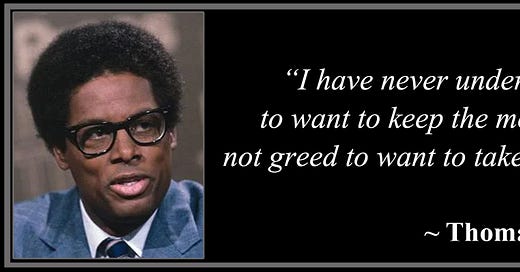In recent years, Thomas Sowell has been a staunch advocate of stricter immigration policies. Which is ironic, because this passage from his Compassion Versus Guilt has stuck with me for thirty years:
When I travel through California’s vast agricultural areas, the people I see working in the fields under the hot sun are usually Mexicans. So are many of the people who clean the hotels. But when I have been approached by a panhandler in San Francisco or Los Angeles, it has never been a Mexican.
Almost invariably, the panhandlers have been young, healthy-looking whites with middle-class accents. These men remind me of the old English expression, “sturdy beggars.”
One nicely dressed young woman with a well-modulated voice looked so different from the image of the panhandler that I was already past her before I realized that that was what she was. But I have seen her again. She works one of the better business districts of San Francisco.
All I can do is walk past such people. To give them money would be to say that they are somehow better than the Mexicans who have to earn their living by helping to feed the rest of society and by keeping hotels and offices clean. How these young, middle-class people get the nerve to ask a black man (whose mother was a maid) for money is beyond me.
Many, probably most, of the Mexicans Sowell is talking about would have entered the U.S. illegally. But back in the 1980s, he didn’t care about their immigration status. He looked past our oppressive regulations to judge people on their merits. And it wasn’t a hard call, either.
I’m just starting my next book, Poverty: Who To Blame. But when the book finally comes out, you should definitely expect Sowell’s wise words contained therein.
The post Meritocracy Without Borders: Sowell Edition appeared first on Econlib.





I have always disagreed with the conservative arguments that immigrants are the least law-abiding citizens which is why there should be tighter control of the borders. But I am unable to defend my libertarian view in light of headlines like this:
"How Sweden is Destroyed by the Immigration Crisis"
https://www.youtube.com/watch?v=rUw4cs2MHwc
I read the linked article by Thomas Sowell (published in 2011), which makes good points that Bryan doesn't address here.
The proper purpose of immigration laws and policies, Thomas says, is to serve this country's national interest -- by which he means, I take it, the collective interest of this country's current citizens. Further, he maintains that no one has a moral right to come here in violation of its legally-established limits on immigration, nor does passage of time retroactively confer any such right to violators.
"[D]octrinaire libertarians," he notes, "see the benefits of free international trade in goods and extend the same reasoning to free international movement of people. But goods do not bring a culture with them. Nor do they give birth to other goods to perpetuate that culture."
To which I would add that people also come with innate intellectual capacity largely determined by genetic combinations that will be passed along to their progeny. In view of which I submit that it's not in the best interest of our descendants to exacerbate the effect of the dysgenic birthrate skew that's firmly entrenched in this country by accepting all comers without attempting to screen out those whose ascertainable intelligence is well below the current national median. Admittedly, however, immigration restrictions won't help much in the long run if we fail to redress the birthrate skew, which is a far more politically formidable objective.